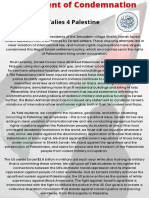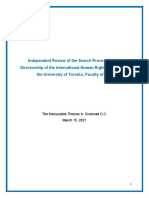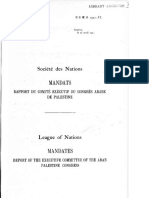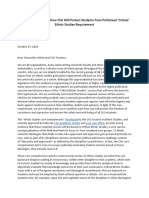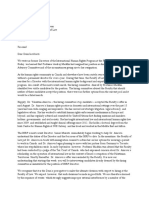Professional Documents
Culture Documents
Landau. On Objectivity
Uploaded by
Samantha Mandeles0 ratings0% found this document useful (0 votes)
65 views12 pagesPolitical philosopher and professor Martin Landau, On Objectivity
Original Title
1972. Landau. on Objectivity
Copyright
© © All Rights Reserved
Available Formats
PDF or read online from Scribd
Share this document
Did you find this document useful?
Is this content inappropriate?
Report this DocumentPolitical philosopher and professor Martin Landau, On Objectivity
Copyright:
© All Rights Reserved
Available Formats
Download as PDF or read online from Scribd
0 ratings0% found this document useful (0 votes)
65 views12 pagesLandau. On Objectivity
Uploaded by
Samantha MandelesPolitical philosopher and professor Martin Landau, On Objectivity
Copyright:
© All Rights Reserved
Available Formats
Download as PDF or read online from Scribd
You are on page 1of 12
Comment: On Objectivity
Martin Landau
The American Political Science Review, Vol. 66, No. 3 (Sep., 1972), 846-856.
Stable URL:
bttp//links jstor.org/sici?sici=0003-0554%28197209%2966%3A3%3C846%3ACOO%3E2,0,CO%3B2-V
The American Political Science Review is currently published by American Political Science Association.
‘Your use of the ISTOR archive indicates your acceptance of JSTOR’s Terms and Conditions of Use, available at
hhup:/www.jstororg/about/terms.hml. JSTOR’s Terms and Conditions of Use provides, in part, that unless you
have obtained prior permission, you may not download an entire issue of a journal or multiple copies of articles, and
you may use content in the JSTOR archive only for your personal, non-commercial use.
Please contact the publisher regarding any further use of this work. Publisher contact information may be obtained at
hup:/www jstor-org/journals/apsa.heml.
Each copy of any part of a JSTOR transmission must contain the same copyright notice that appears on the sereen or
printed page of such transmission,
STOR is an independent not-for-profit organization dedicated to creating and preserving a digital archive of
scholarly journals, For more information regarding JSTOR, please contact support @jstor.org.
hupslwww jstor.org/
‘Wed May 19 12:54:06 2004
Comment: On Objectivity
Martin Lanpau
University of California, Berkeley
While I thoroughly enjoyed reading Miller's
paper—it is a very graceful presentation, Tam
nevertheless left with a sense of disquiet. Tts
strokes are so broad and its statements so
sweeping, that it tends to gloss over a series of
rather critical problems. And given its enor-
‘mous range of coverage, it becomes a virtual
impossibility, in the space allowed me, to re-
spond to each of the elements that I consider
problematic.
‘One could, for example, raise question as to
the imputed ‘relationship between logical posi-
tivism and behavioralism, When the over-
whelming emphasis that logical positivists have
placed on formalized logics is taken account of,
‘SLi fair to say" that their influence on the be-
hhavioral movement is a matter to be investi
pated, There has been, of course, much discus-
sion of science in general and, more particu-
larly, of formalization and axiomatization by
political scientists, but it is rather obvious that
the bulk of behavioral research has exemplified
a “barefoot empiricism.” It is only recently,
with the advent of mathematics inio political
science, that one observes a movement toward
formal modes of explanation. Unless numbers
are equated with logical positivism, the line be-
tween it and behavioral research becomes
rather tenuous. It was Graham Wallas who
urged, in 1908, that we must learn to think in
terms’ of statistical curves, and the National
Conference on the Science of Politics in the
1920s was responding, not to the Vienna Cir-
cle, but to the extensive use of “tests and mea-
surements” during World War T; and the up-
surge of survey research in the 1950s owed
more to advances in research design and statis-
tical technique than it did to Schlick, Carnap,
Feigl and Hempel. It is also of interest that
many “behavioralists"—even today, resist the
“logical reconstruction” of formal models as
arid and sterile, as for too distant from experi
tence. The case could be made that the political
scientists who fashioned behavioralism vastly
‘overestimated Bacon,
‘Or, one wonders why there is so much dis-
cussion of phenomenology—and of what is
haere selected to represent phenomenological re-
searches—when the only studies that bear even
Temotely on polities are those of Schutz, Gar-
finkel, and company. T have no doubt that we
shall "soon see some rather interesting re-
searches along these lines and I have no hesita-
suggesting that these will be strictly em-
Iie, if they follow Schutz and Gar-
pire
nel
‘Or, how does it happen that the new “leading
theory of knowedge™ aries at atime when an
Intense power srugee going on in the ro-
fesion? Here, I should have sesomed tht p=
per which takes ite ce from Mannheim and
The historicity of the mind would have otto
Ghced a more specie consideration of the rela.
tion between “Weologieal snd epistemalosical
Giaims, There is more to the restive thrust
than contemporary cspites inthe philosophy
Bot above all, what I find most dstrbing i
te lack of any sustained analysis of relate
fn cbjstiviy n'a paper which fcetanly ad
Ghessed to these themes. Accordingly 1 have
‘Shosen to center any remarks on these problems
in the hope of stimulating» isusvon that may
yet lead foward a solution of these. problems
Too often it seems, we go around in circles
My. fist comment offer some enti
Millers use of the category “histone my
Second isa consideration of relatiism=a doc
tine which T think is entirely tenable my
thi, digesion perhaps, Is designed to cor
rect some impressions (in political science) of
the Vienna Cirle; my fourth i a considertion,
In detail of the concept of objectives and my
final comment iva bret note of auton on the
tse of Kuhns study as 3 leptimating agent. 1
beg off direct comment on Cunnel, Wali,
Connoly, Kare, Surkin nd Tung because this
Srould require another paper. Bot T have 2d
Gressed some oftheir writings chewhere*Toso-
far as Eaton is concerned, T agree that he has
made eros
(i) Av. preliminary comment on “Posi
ism Historie and Politea!Taguiy,” Tish
{eal attention tothe rather loos constriction
Of the term historic,” Ax presented inthis
essay, caries a "soft foeus"= it connotation
{Sto difse as to give rise inevitably to ambigw-
ity, An admission incidentally that historic
isan ambiguous term does not by sel hep to
Srity rather, it signals the eed for claren
‘Martin Lande, Political Theory and Polite Seix
cencet Suuties in the Methodology of Politeal Inquiry
‘New York: Macmian. 1972)
846
1972
tion, For concepts of this kind are a patent lia-
bility in any domain of inquiry, especially as
regards methodological problems, because they
conduce to the indeterminate and the indefinite.
Tt needs to be emphasized that the function of a
Aefinition is exactly the opposite—to make @
class term, a category or concept definite
Terms which have loose meanings, which are
vague and ambiguous, generate the elasticity of
equivocation. They allow for alternative and
uncertain reactions, And this means that no
amount of observation can settle a dispute. An-
swers can never be clearer than the questions
‘which prompt them.
“Moreover, diffused connotations tend also to
be “noisy.” They frequently contain a confus-
ing variety of characteristics, many of which
are inconsistent with each other, many of
which are unrelated to each other. The result is
then the collection of a miscellany that one of-
ten refers to as an “oversimplification.” (Paren-
thetically, I should like to distinguish this type
‘of concept from one that is general or compre
hensive: the mark of the latter is that it points
to invariances—properties or relationships that
seemingly diverse phenomena have in common
without the clutter of incidental associations.)
Oversimplification results in the clustering of s0
disparate a group of philosophers as are here
assigned to the class “historicist,” thereby per-
mitting a bypass of such profound differences
as, for example, that between historical deter-
rminism and historical relativism, A historical
basic method of knowing is induct
by “analysis of sense-data one can inductively
laws
reach the most general and objective
of nature."? Further, the soft focus in e
permits the confusion of relativism as an epi
temological position and the distinctive empiri
cal hypothesis known as the “historicity of the
mind.” These are not necessarily connected,
and one can find historical determinists (e.g.
Engels and Marx) holding to the latter as they
reject the former. One can even find Mannheim
separating epistemological relativism from the
empirical hypothesis that we have no choice
bout to plagiarize the Zeitgeist—i.e., that social
time, place, and circumstance condition our
thought. This separation is not at all unusual
fon the contrary, it must be made. And the rea-
son, as I shall show below, is this: If the princi
ple of epistemological relativism is correct, then
the thesis of the historicity of the mind cannot
*Narcyr Lubnicki, “Episemological Problems of
Dialectical, Mater Synthase, 7 (1988), 292.
Objective” inthe Leninist (materialist) sens
Comment: On Objectivity
847
be accepted as corret; it cannot even be de-
Cided upon,
‘As a final note on Mr. Miller’ claifiati
scheme, let me add the following? If an opposi
tonto phenomealism,epstemolosca el:
ism, and the historicity of the mind adit to
the set (histories), ithe qualification for
membership i the posession of all of these
Properties, then we shall have to crt asgn-
nent drasealy. And ifthe atibuton of any
One’ of these i any single property admits
the set then it shall have tobe enlarged ad ie
Fini 1 may very well be wrong, but the only
tay fo make sense of s0 motley collection of
philosophers as Miler has asigned tothe cess
Eston s to. sssume thet they sre unfed
by some form of rejection of phenomenal —
which would then take Otto Neorath a histor
cit
"These considerations bear dretly on Mi
c's assertion that after a century of protracted
Confit, histriism has vanquished postism
and has become our leading theory of kaon
flies I think tht this clams patel false
spite the fat that postvism as undergone
fone profound changes since the days of the
Vienna Cirle, Nor has historic had very
uch inldence on the shaping of contempo-
ary approaches, Indeed the extcsm of the
“hibtoriist" has received scant attention, only
that necessary to point out thatthe relative
theory is el-refuting. would have been more
fermane to contemporary developments in the
Philosophy of science had Miller hooked the
These of the historicity of the mind to thone
Philosophers. who. reject “presupposientss”
Theories (as do” Hanson, "Feyerabend, and
Kan) but this isan entirely diferent problem,
fone that does not necessarily lad to relat
ism that enjoins objectivity. Sich philosophers
Sand apart from the. “perpeteal beginner”
(Merteat-Poatys phrase) of phenomenoo
tho, in following’ Husser?s. command, taker
"Ao the things themselves” without preconcep-
tion. For to Huser, phenomenology ss fo be
a rigorous, purely descriptive stud), eminent
Scientific in the most fundamental senee-—ond
itis toward ths goal that metaphysis! specs
tion ‘and. theoretical postulates were to be
“bracketed.” His quarrel with the empiric
turned on the hypothesis that experience” was
far more varied, or complicated, or richer than
the later would or could admit. But for this
“stores i wat the things themselses that
were to be the final arbiters Rejection of the
Tosico (mathematical) -empiical model tn the
Study of human behavior dd -not transform
Hssel into a relativst, Relativism to him was,
You might also like
- 2021 ISCA Conference Booklet (Revised)Document21 pages2021 ISCA Conference Booklet (Revised)Samantha Mandeles100% (1)
- Statement of CondemnationDocument1 pageStatement of CondemnationSamantha MandelesNo ratings yet
- Kohelet Fact Checks and Response To HRW ReportDocument9 pagesKohelet Fact Checks and Response To HRW ReportSamantha MandelesNo ratings yet
- CA Math FW Draft FullDocument779 pagesCA Math FW Draft FullSamantha MandelesNo ratings yet
- Yale Jews For Palestine StatementDocument5 pagesYale Jews For Palestine StatementSamantha MandelesNo ratings yet
- Debunking No Place For HateDocument18 pagesDebunking No Place For HateSamantha Mandeles100% (1)
- HRW Report: A Threshold CrossedDocument224 pagesHRW Report: A Threshold CrossedSamantha MandelesNo ratings yet
- Report of The Hon Thomas A Cromwell CC - March 15 2021Document78 pagesReport of The Hon Thomas A Cromwell CC - March 15 2021Samantha MandelesNo ratings yet
- California Ethnic Studies Model Curriculum, Full and FinalDocument896 pagesCalifornia Ethnic Studies Model Curriculum, Full and FinalSamantha MandelesNo ratings yet
- Brandeis Center Letter To Tufts President Monaco Feb. 3 2021 With Redacted ExhibitsDocument110 pagesBrandeis Center Letter To Tufts President Monaco Feb. 3 2021 With Redacted ExhibitsSamantha MandelesNo ratings yet
- Reaction Statement From David Matas About The University of Toronto Review by Justice CromwellDocument2 pagesReaction Statement From David Matas About The University of Toronto Review by Justice CromwellSamantha Mandeles100% (1)
- New North Carolina Social Studies Curriculum GuidelinesDocument65 pagesNew North Carolina Social Studies Curriculum GuidelinesSamantha MandelesNo ratings yet
- Arab Commission Letter To ChurchillDocument21 pagesArab Commission Letter To ChurchillSamantha MandelesNo ratings yet
- Orgs To CSU Ethnic Studies Requirement 10.27.20Document5 pagesOrgs To CSU Ethnic Studies Requirement 10.27.20Samantha MandelesNo ratings yet
- ClimaxIDF BWDocument5 pagesClimaxIDF BWSamantha MandelesNo ratings yet
- Tufts Exhibit A RedactedDocument40 pagesTufts Exhibit A RedactedSamantha MandelesNo ratings yet
- SJP Statment On Passing ReferendumDocument3 pagesSJP Statment On Passing ReferendumSamantha MandelesNo ratings yet
- Boim V AMPDocument51 pagesBoim V AMPSamantha MandelesNo ratings yet
- PFLP StrategyforLiberationofPalestine1969Document75 pagesPFLP StrategyforLiberationofPalestine1969Samantha MandelesNo ratings yet
- Scholars Concerned About ESMC Claims 1.21.21Document11 pagesScholars Concerned About ESMC Claims 1.21.21Samantha MandelesNo ratings yet
- Simon (2000), Public Administration in World of Organizations and MarketsDocument9 pagesSimon (2000), Public Administration in World of Organizations and MarketsSamantha MandelesNo ratings yet
- Letter To Dean Iacobucci From Former IHRP Directors Sep 12Document2 pagesLetter To Dean Iacobucci From Former IHRP Directors Sep 12Samantha MandelesNo ratings yet
- MES Insights Vol 11 Issue 5Document4 pagesMES Insights Vol 11 Issue 5Samantha MandelesNo ratings yet
- MAS-ICNA Tarbiyah GuideDocument18 pagesMAS-ICNA Tarbiyah GuideAmericans for Peace and ToleranceNo ratings yet
- Sir Maejor Page AKA Tyree Conyers-Page AffidavitDocument10 pagesSir Maejor Page AKA Tyree Conyers-Page AffidavitPeter Hasson100% (1)
- Sept 30 2020 Letter To Dean Iacobucci of University of Toronto Law SchoolDocument3 pagesSept 30 2020 Letter To Dean Iacobucci of University of Toronto Law SchoolSamantha MandelesNo ratings yet
- Letter To Dean Iacobucci From Former IHRP Directors Sep 12Document2 pagesLetter To Dean Iacobucci From Former IHRP Directors Sep 12Samantha MandelesNo ratings yet
- "Israel-Palestine" Platform For Marie NewmanDocument3 pages"Israel-Palestine" Platform For Marie NewmanSamantha MandelesNo ratings yet
- AMP Program Booklet and Training ManualDocument38 pagesAMP Program Booklet and Training ManualSamantha MandelesNo ratings yet
- The Yellow House: A Memoir (2019 National Book Award Winner)From EverandThe Yellow House: A Memoir (2019 National Book Award Winner)Rating: 4 out of 5 stars4/5 (98)
- Hidden Figures: The American Dream and the Untold Story of the Black Women Mathematicians Who Helped Win the Space RaceFrom EverandHidden Figures: The American Dream and the Untold Story of the Black Women Mathematicians Who Helped Win the Space RaceRating: 4 out of 5 stars4/5 (895)
- The Subtle Art of Not Giving a F*ck: A Counterintuitive Approach to Living a Good LifeFrom EverandThe Subtle Art of Not Giving a F*ck: A Counterintuitive Approach to Living a Good LifeRating: 4 out of 5 stars4/5 (5794)
- The Little Book of Hygge: Danish Secrets to Happy LivingFrom EverandThe Little Book of Hygge: Danish Secrets to Happy LivingRating: 3.5 out of 5 stars3.5/5 (400)
- Devil in the Grove: Thurgood Marshall, the Groveland Boys, and the Dawn of a New AmericaFrom EverandDevil in the Grove: Thurgood Marshall, the Groveland Boys, and the Dawn of a New AmericaRating: 4.5 out of 5 stars4.5/5 (266)
- Shoe Dog: A Memoir by the Creator of NikeFrom EverandShoe Dog: A Memoir by the Creator of NikeRating: 4.5 out of 5 stars4.5/5 (537)
- Elon Musk: Tesla, SpaceX, and the Quest for a Fantastic FutureFrom EverandElon Musk: Tesla, SpaceX, and the Quest for a Fantastic FutureRating: 4.5 out of 5 stars4.5/5 (474)
- Never Split the Difference: Negotiating As If Your Life Depended On ItFrom EverandNever Split the Difference: Negotiating As If Your Life Depended On ItRating: 4.5 out of 5 stars4.5/5 (838)
- Grit: The Power of Passion and PerseveranceFrom EverandGrit: The Power of Passion and PerseveranceRating: 4 out of 5 stars4/5 (588)
- A Heartbreaking Work Of Staggering Genius: A Memoir Based on a True StoryFrom EverandA Heartbreaking Work Of Staggering Genius: A Memoir Based on a True StoryRating: 3.5 out of 5 stars3.5/5 (231)
- The Emperor of All Maladies: A Biography of CancerFrom EverandThe Emperor of All Maladies: A Biography of CancerRating: 4.5 out of 5 stars4.5/5 (271)
- The World Is Flat 3.0: A Brief History of the Twenty-first CenturyFrom EverandThe World Is Flat 3.0: A Brief History of the Twenty-first CenturyRating: 3.5 out of 5 stars3.5/5 (2259)
- On Fire: The (Burning) Case for a Green New DealFrom EverandOn Fire: The (Burning) Case for a Green New DealRating: 4 out of 5 stars4/5 (73)
- The Hard Thing About Hard Things: Building a Business When There Are No Easy AnswersFrom EverandThe Hard Thing About Hard Things: Building a Business When There Are No Easy AnswersRating: 4.5 out of 5 stars4.5/5 (344)
- Team of Rivals: The Political Genius of Abraham LincolnFrom EverandTeam of Rivals: The Political Genius of Abraham LincolnRating: 4.5 out of 5 stars4.5/5 (234)
- The Unwinding: An Inner History of the New AmericaFrom EverandThe Unwinding: An Inner History of the New AmericaRating: 4 out of 5 stars4/5 (45)
- The Gifts of Imperfection: Let Go of Who You Think You're Supposed to Be and Embrace Who You AreFrom EverandThe Gifts of Imperfection: Let Go of Who You Think You're Supposed to Be and Embrace Who You AreRating: 4 out of 5 stars4/5 (1090)
- The Sympathizer: A Novel (Pulitzer Prize for Fiction)From EverandThe Sympathizer: A Novel (Pulitzer Prize for Fiction)Rating: 4.5 out of 5 stars4.5/5 (121)
- Her Body and Other Parties: StoriesFrom EverandHer Body and Other Parties: StoriesRating: 4 out of 5 stars4/5 (821)

